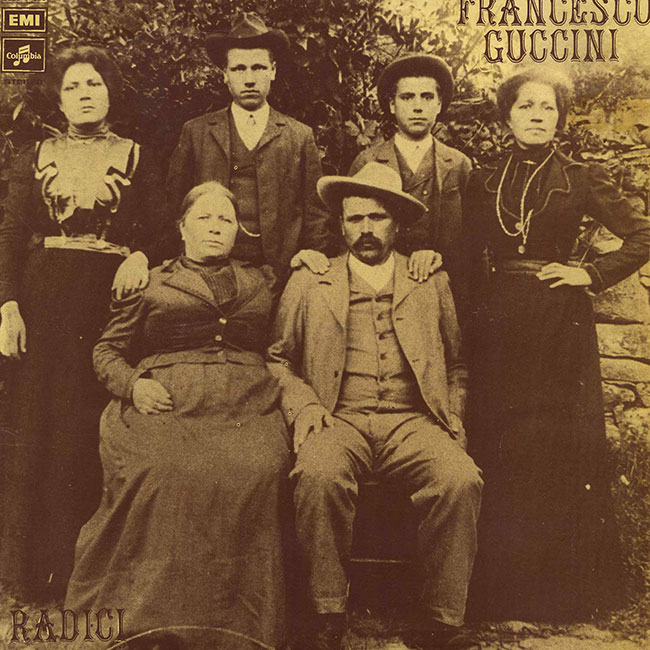La locomotiva

‘And now, to wrap things up, I need something about “La locomotiva”’.
‘Com’on! I’ve already written about that thousands of times…’
‘Trust me, we need it. It’s your most famous song, and people …’
‘Hold on! You make it sound like it’s the only thing I’ve ever written. I’ve done other songs – I’m not sure if you’re aware of that. I like singing it at the end of concerts, but what do you want me to say about it that I haven’t said already? Everyone knows that story today!’
‘But just a few lines, a short page, even just half.’
I’m wondering whether I should hit Beppe Cottafavi, the editor of this book, with whatever blunt object I happen to find within reach. The phone? Too soft. The small vase with the pens and pencils? But they would fly all over the place and it would be a pain to pick them all up.’
‘But that story about Roberto Leydi, for example.’
‘Yes, Leydi, the great folklorist. They had just opened the DAMS department. He was teaching there and I went to hear him speak because I was interested in his lectures. At the time I was doing research on folk songs here in the Apennines. Later we met, in Bologna at a storytellers’ festival, in ’71 or ’72, I think, I’m not sure. During a break, I took him from Piazza Maggiore to the Osteria delle Dame to show it to him. I was planning to invite Bruno Pianta to sing, a folklorist who collaborated with Leydi. In the end he actually came, and I sang ‘La locomotiva’ for him there. He said it was the greatest folk song of the post-war period. Folk song, you understand, not the greatest songwriter’s song or anything like that…’
‘Well, actually, it is very much like a folk song. But how did that whole scene come into being?’
‘Back then, my friends and I sang a little bit of everything: the anarchist songs of Pietro Gori, for example. As I said, I was doing research on folk songs. I bought a little Philips tape player. Later I became more familiar with recording, and a friend got hold of a professional tape recorder, while I bought a nice microphone, with two heads, for direct and background sounds. I still have that microphone somewhere, but I don’t know what became of the tape recorder – it doesn’t matter. But that was the general atmosphere. There was another song, ‘Nel fosco fin del secolo morente’, which I always called the ‘grandmother’ of ‘La locomotiva’. So when I read that book by Bianconi, Trent’anni d’officina (‘Thirty years in the workshop’), that song almost wrote itself. I also talked to my neighbour, Mr Mignani, the one I described in the song ‘Il pensionato’. Mignani told me the real story of the railway worker, who was mentioned in passing in Bianconi’s book. Mignani was an old socialist: I think that under the fascists he even got punished with a dose of castor oil. He knew Rigosi’s story well, the train driver in the song.’
‘“I don’t know what he looked like…” and so on’.
‘Actually, the first line was the last one I wrote. The song began “I know the time of the events, the job he did…”. But then I realised that something was missing – a beginning, an introduction. By the way, I want people to know that the expression “heroes are all young and handsome” should be understood ironically. It’s not meant to be pretentious, even if there’s something intentionally pretentious about the song, just like in anarchist or popular songs.
‘But was Leydi the first one to hear the song?’
‘Not at all. First there were my Bologna friends, the ones at the Osteria. Whenever I had a new song, I played it for my friends. You know, guitars, wine and all that. Then I always had to play new songs for my cousin Alberto Prandi, from Carpi. He was a member of the Federation of Anarchists of Carpi, together with a friend, who isn’t a friend anymore because he became a Lega supporter, imagine that. I would occasionally go to Carpi with a few friends from Bologna to party. We would arrive in the afternoon and have a snack – Lambrusco and salami. In the evening we’d have dinner at some country trattoria. It was on one of those occasions that I played the song for him: it floored him, of course – it seemed to have been written just for him.’
‘And in public?’
‘Well in those days, as you know, I didn’t give concerts. I would sometimes play at the Dame, but I think the first public performance was at the first edition of the Club Tenco in Sanremo, in ‘73, though I could be mistaken. I had to do two evenings, the first and the last, to fill in for a colleague who didn’t show up. Both concerts ended with ‘La locomotiva’: it was there that I saw raised fists for the first time.’
From: Guccini, Francesco, Non so che viso avesse. Quasi un’autobiografia, Milan, Mondadori, 2010, pp. 110-113.
